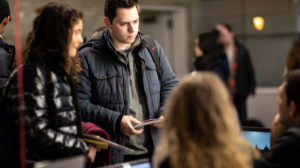For my final blog about my study abroad experience, I’d like to provide some very practical tips for other students studying abroad that I wish I would have known before embarking on this journey.
Phone Plans
While most U.S. cell phone service providers offer international plans, they are generally much more expensive than getting a local SIM card. I got mine from the local provider TIM, which had a deal providing 10 gigabytes of data a 1000 domestic minutes per month for $10. Be aware, however, that for some plans like mine you need to manually go to a store and renew your plans each month or whenever you run out of a data. While 10 gigabytes seems like a lot, you will be charged more for your data use when you are travelling out of country, so it is possible to run out of data early unexpectedly. Stay on top of how much you are using so you don’t find yourself stranded without Uber and google maps!
Transportation
Speaking of Uber, it is important to figure out what taxi/ride share apps function in the area you are living. In Rome, Uber exists but is not technically legal. While those who use the service cannot be punished, those who work for the company can be. I recommend using MyTaxi, which is an app that functions essentially the same as Uber or Lyft. Also, regarding public transportation, it is a good idea to check how much a month pass for the busses and subway system costs and if it would be worth the investment. I ended up buying a month pass for Rome’s public transit system for my first two months in the city, but then stopped renewing it because I realized I wasn’t getting my money’s worth.
Finances
When handling finances in general while abroad, don’t forget to notify your bank that you will be using your debit and/or credit cards in foreign countries. Also, investigate what kinds of conversion fees you will be charged for either withdrawing cash or using your card internationally. Some banks offer international travel cards, which I found out about too late but I wish I had investigated earlier to avoid such high fees. It is also important to figure out if you are charged more for withdrawing cash or charging items to know which option you should try to use most. Be aware, however, that, at least in Rome, far fewer places accept cards than in the U.S. Because of that, bring some cash in the local currency with you and be prepared to regularly withdraw from an ATM.
Food
A pattern that I have begun to notice when studying or travelling abroad for long periods of time is that my American companions and I get tired of local food fairly quickly. As delicious as authentic Chinese, Latin American, and even Italian food are, eating the same cuisine week after week and month after month can become tiresome. I think that this likely occurs because we come from a country where fantastic, affordable food options from every style of cuisine around the world are available to us at all times. As Americans, we are spoiled by variety. Because adjusting to a more uniform cuisine can be difficult, I recommend that students pace themselves and try to vary their food choices at the beginning. If you eat pizza and pasta for breakfast, lunch, and dinner, you will burn out quickly, not to mention how the toll this carb and cheese heavy diet will have on your energy and metabolism levels. Try to branch out and try more unique options, and also try to get in the habit of cooking at home on the week days for the sake of your health and your budget. I have found that it is much easier to cook a healthy meal packed with fruits and vegetables myself than it is to buy one at a restaurant. Also, it can be fun to shop for ingredients at open air markets and local grocery stores. A simple activity like this gives you a taste of true local life!
Travelling
If you are studying in Rome or another city in Europe, chances are you will want to explore other parts of the country or continent as well. At the beginning of my explorations, the trip planning process was confusing and time consuming. As I got more used to planning weekend excursions, however, I began to become familiar with the best websites to use for transportation and lodging. This familiarity made the whole process a lot faster and simpler. For finding flights, I normally used Google Flights or Skyscanner. A tip that I heard from a friend and that I was surprised to find out was true is that, if you have a mac laptop, search for flights in “incognito” or “private” mode. If the site detects that you are searching from a mac, it will increase the prices or only show more expensive flights. If you aren’t travelling as far and need a train or bus ticket instead of a flight, I recommend booking through the website goeuro. The site price compares the cheapest busses, trains, and even flights. At times I have found that busses have been cheaper, but at other times trains have been, so it is always worth it to check. Also, some high speed trains go more than twice as fast as other regional lines, so take that into consideration when booking.
Lastly, for booking your lodging, I recommend looking at airbnb (which is very popular now and probably requires no explanation), as well as hostel world and booking.com. As the name suggests, hostel world is a site that connects travelers to hostels all over the world. I especially like that visitors to the site can filter hostels based on both price and proximity to the city center. Booking.com is a very useful and comprehensive site, displaying hostels, hotels, and bnb/apartments for rent. I have used all three of these sites at one point or another and have been able to find affordable, quality lodging to suit all of my travel needs.











